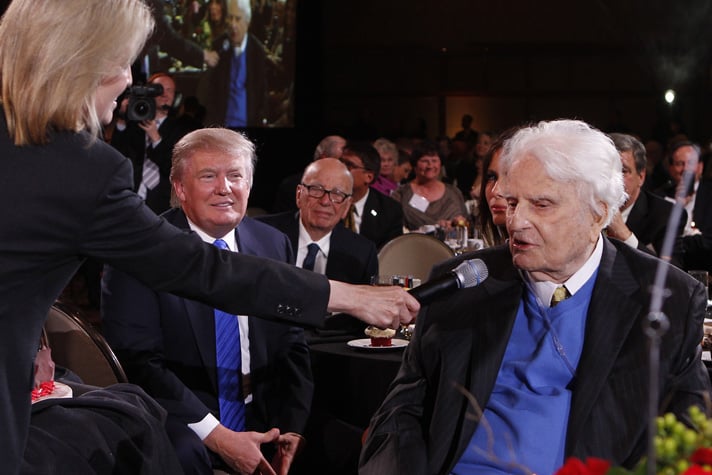US President Donald Trump has described Billy Graham as “a very special man,” after the famed preacher’s death at 99.
“The GREAT Billy Graham is dead. There was nobody like him! He will be missed by Christians and all religions,” Trump tweeted on Tuesday.
Vice-President Mike Pence offered condolences to the Graham family, saying the evangelist’s “matchless voice changed the lives of millions”.
“We mourn his passing but I know with absolute certainty that today he heard those words, ‘well done, good and faithful servant,’” Pence tweeted.
Advertisement
Graham was nicknamed “God’s machine gun,” and he did not find it offensive at all.
On the contrary, the US televangelist with a rapid-fire delivery and booming voice always wanted to be considered a fighter, a soul-catcher.
Through crusades”alone, the former Baptist pastor reached a worldwide audience of 215 million people in person, and countless found their faith through him.
Advertisement
In spite of his conservative positions on morals, he was considered for decades the “pope” of US protestants and was by far the leading mass evangelist of the 20th century.
When he bid farewell to his supporters in 2005, in a three-day mass show in New York with a cumulative audience of over 230,000 people, he said he was happy to be seeing God’s face soon.
Graham’s impact rests on a simple message delivered to the public for six decades: “Jesus loves you. Let him into your life and your sins will be forgiven.”
With brilliant rhetoric, simple words and clear examples from everyday life, he adapted this message for all walks of life.
Advertisement
He renounced racial segregation early on, saying there was basis for it in the bible, while railing against communism and what he saw as the widespread decline of values.
In post-war times, he supported the hunt for communists of the McCarthy era, and later the US waging of the Vietnam War.
In the 1980s, he increasingly gave up on addressing political issues and focused on what one critic called a “soft-focus” fundamentalism.
Graham was at the centre of a scandal in 2002, when a home recording of a dialogue between him and then US president Richard Nixon in 1972 was made public.
The preacher, one of the country’s great moral institutions, spoke of an alleged Jewish “stranglehold” of the media that had “got to be broken.”
Graham later apologised for these comments, which he said he did not remember having made.
Advertisement
The influential pastor was socially conservative but presented himself as non-partisan, serving as an advisor and confessor for other presidents besides Nixon, including Democrat Lyndon Johnson, and Republicans Gerald Ford and George H W Bush.
Advertisement
Add a comment






